Students clamber down the steps of Treasure Hill (寶藏巖), cameras and notebooks in hand. They've spotted a group of elderly residents who have emerged from their houses and met up in a neighboring courtyard. As the students approach, all but one of the old people duck for cover inside their homes. One remaining man, a retired soldier named Chen, makes a stand against the platoon of pupils as they fire questions and requests at him.
"What's your name, sir?" one of them asks.
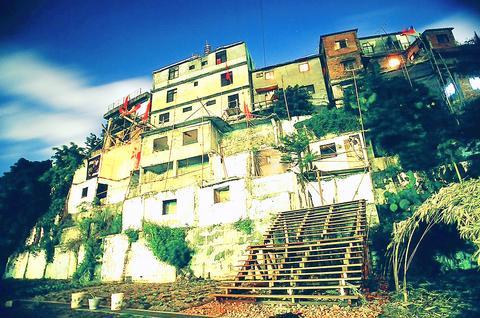
PHOTO: STEPHEN WILDE
"How do you feel about all the changes here?" another wants to know.
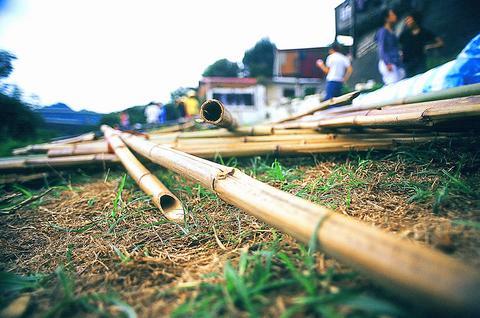
PHOTO: STEPHEN WILDE
Still another is curious which house on the hill Chen lives in and if he can take his photo standing in front of it. Another asks if he can help him redesign it.
Chen holds out bravely but has clearly had enough. "I'm going to eat," he announces and mounts his scooter in retreat.

PHOTO: STEPHEN WILDE
The relative peace that this squatter community enjoyed in the five decades after it was first settled by Chinese Nationalist Party soldiers from China is gone. The area was rezoned as parkland in 1980 and then, 13 years later, notices were posted on doors warning residents that the labyrinth of illegal piecemeal buildings would soon be razed.
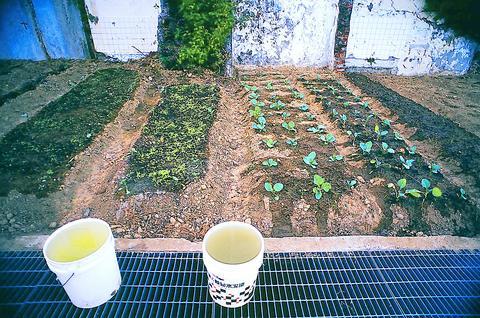
PHOTO: STEPHEN WILDE
Treasure Hill quickly became a cause celebre for student activists and academics who saw the community as representative of the city's past. In the 1950s, they argued, 30 percent of Taipei was squatter villages hastily constructed to accommodate the almost immediate doubling of the local population by mainlanders who fled the communist army.
While most of those communities have since been turned into parks or been replaced with modern buildings, Treasure Hill remains as both a reminder of the past and present home to some 100 people; many of them are poor retired soldiers, others are immigrants from southeast Asian countries, still others are students attending neighboring universities.

PHOTO: STEPHEN WILDE
When the eviction notices went up, the academics and activists protested and the city government demurred. Responsibility for the future of the area was transferred from the Department of Parks and Recreation to the Bureau of Cultural Affairs, which became charged with, essentially, making Treasure Hill less of an embarrassment to a city bent on modernizing. Now it's become the stomping ground for culturati who see the promontory as an "organic community" and come on their days off as part of the Global "Artivists" Participation Plan (GAPP).
GAPP is the brainchild of the Organization of Urban Re-s (OURs), a group commissioned to "legitimize the squatters' residency" on the public land. OURs' current proposal, written by one of its core members, National Taiwan University professor Kang Min-jay (康旻杰), is to "create a co-living commune which will incorporate the original resident units as alternative social housing, a youth hostel, and an artist-in-residence program." OURs' primary goal is for the area to be seen more as a preservation district than a park.
"In the beginning, we didn't want to take part in developing an artist village here. We thought it was fake," Kang said. "But the Bureau of Cultural Affairs mandated that there be one and it became a matter of `Well, if we don't do it, someone else will.' OURs at least had established roots in the community."
OURs plans to build a community kitchen, dining facility and co-op neighborhood store. Already they've planted a community garden, begun screening free outdoor movies for residents and staged absurdist dramas by local theater companies. They also publish a community newspaper that's distributed door to door and read aloud to anyone who can't read.
"I go [to the movies and plays] because it's too loud to sleep," said one elderly resident. "The movies are nice, but the plays are very strange."
There have been other strange things. In October, the Culture Affairs Bureau hired the services of Finnish artist, architect and son of a circus family, Marco Casagrande. After an extensive clean-up of the hill and constructing a few flights of stairs, he painted his face red and led his crew of volunteers on a "parade." They tied bits of the junk they'd collected to scaffolding and rolled it through the streets of Gongguan, ceremonially bringing Treasure Hill into the larger community.
Reaction to Casagrande's work and the many other artists and performers that have tread the boards at Treasure Hill has been mixed. At first there was a near universal reticence to take part in the clean-up and building projects, or attend the artistic functions, but residents appear to be warming to the activities.
"One elderly man came up to me and said, `Why do you keep inviting all these artists here?" Kang said. "I thought he was mad at first, but he was actually saying he and his friends wanted to perform some old songs themselves."
But the majority of elderly residents interviewed for this report -- most of them retired Nationalist soldiers -- expressed a mix of appreciation that they were no longer facing eviction and nervousness at the amount of attention they're receiving from the public.
That attention is now coming largely from classes of university students. One class at National Taiwan University, taught by Kang, has been assigned to find a resident or would-be resident artist and help redesign their home.
"We're supposed to work with them to come up with a design that improves the aesthetics of the neighborhood and makes their house more livable," said Dustin Yang (楊永達) of his assignment. "The idea is to use found materials, but any costs would be paid by the resident."
"I've lived here 40 years," said another retired soldier who declined to give his name. "If I could afford to make my house nicer I would, or else I'd move somewhere else. I don't need a student to tell me what my house should be like."
In fairness, the NTU class assignment does something which hasn't yet happened at Treasure Hill in any great measure: it offers a plan that takes into consideration the needs and desires of the hill's long-term residents.
"If you can convince one person, maybe they will inspire 100 others," Kang said, adding that the hill has long been dominated by elderly men and that the broader, heterogeneous community has been more receptive to OURs' efforts.
"It's hard to tell if this is the right or wrong thing to do," he said of the organization's plans for Treasure Hill. "We don't want to be accused of putting our values on the residents."
It may have already happened. As artists are paraded through and loudspeakers announce the screening of another film classic from China, many elderly residents are both resentful that the future of Treasure Hill is being decided by people who don't live there, and resigned to the fact that they themselves won't be a part of it.
"Many of us are very old," said the retired soldier. "I don't care what this place becomes in the future, but for now I'd like to be left alone."

Seven hundred job applications. One interview. Marco Mascaro arrived in Taiwan last year with a PhD in engineering physics and years of experience at a European research center. He thought his Gold Card would guarantee him a foothold in Taiwan’s job market. “It’s marketed as if Taiwan really needs you,” the 33-year-old Italian says. “The reality is that companies here don’t really need us.” The Employment Gold Card was designed to fix Taiwan’s labor shortage by offering foreign professionals a combined resident visa and open work permit valid for three years. But for many, like Mascaro, the welcome mat ends at the door. A
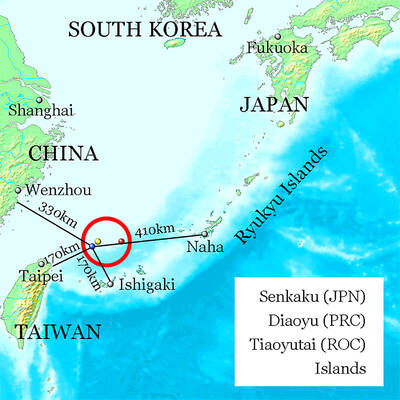
Last week gave us the droll little comedy of People’s Republic of China’s (PRC) consul general in Osaka posting a threat on X in response to Japanese Prime Minister Sanae Takaichi saying to the Diet that a Chinese attack on Taiwan may be an “existential threat” to Japan. That would allow Japanese Self Defence Forces to respond militarily. The PRC representative then said that if a “filthy neck sticks itself in uninvited, we will cut it off without a moment’s hesitation. Are you prepared for that?” This was widely, and probably deliberately, construed as a threat to behead Takaichi, though it
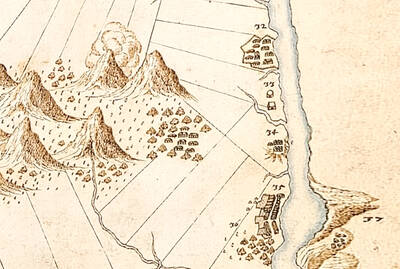
Nov. 17 to Nov. 23 When Kanori Ino surveyed Taipei’s Indigenous settlements in 1896, he found a culture that was fading. Although there was still a “clear line of distinction” between the Ketagalan people and the neighboring Han settlers that had been arriving over the previous 200 years, the former had largely adopted the customs and language of the latter. “Fortunately, some elders still remember their past customs and language. But if we do not hurry and record them now, future researchers will have nothing left but to weep amid the ruins of Indigenous settlements,” he wrote in the Journal of

If China attacks, will Taiwanese be willing to fight? Analysts of certain types obsess over questions like this, especially military analysts and those with an ax to grind as to whether Taiwan is worth defending, or should be cut loose to appease Beijing. Fellow columnist Michael Turton in “Notes from Central Taiwan: Willing to fight for the homeland” (Nov. 6, page 12) provides a superb analysis of this topic, how it is used and manipulated to political ends and what the underlying data shows. The problem is that most analysis is centered around polling data, which as Turton observes, “many of these